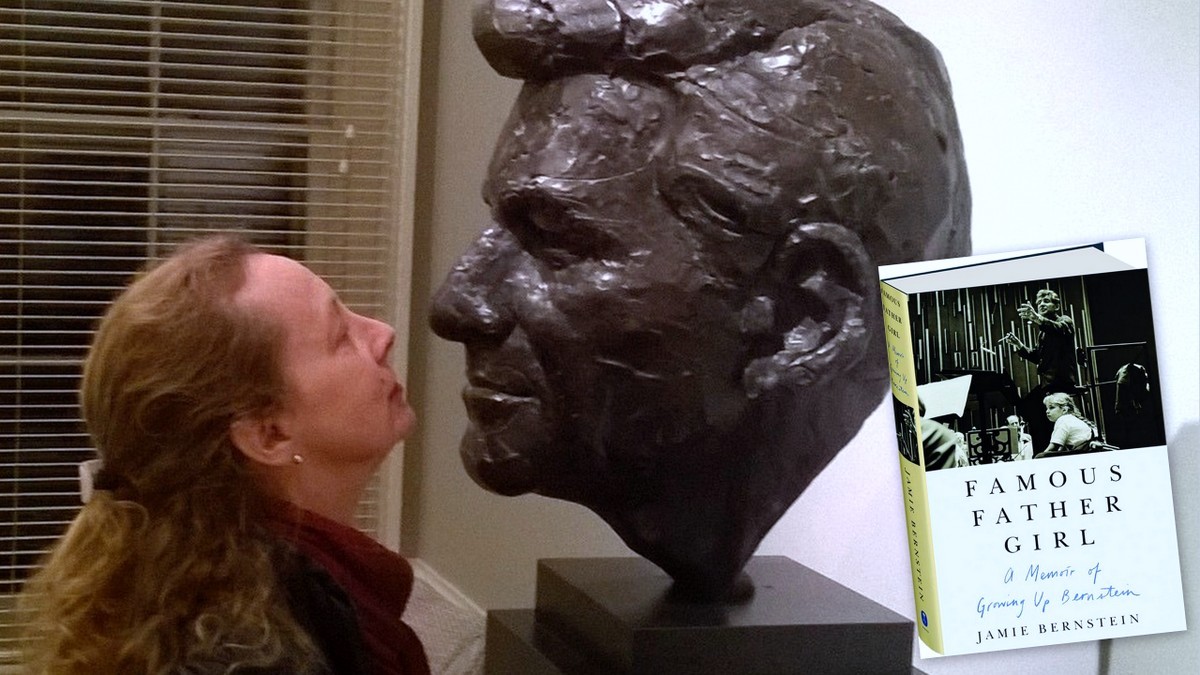Daughter's Book Celebrates Legacy of Leonard BernsteinBy Stephen Dankner, Guest Column
12:00PM / Friday, August 17, 2018 | |
 Jamie Bernstein gets up close to a statue of her father, Leonard Bernstein, at Tanglewood. She has just released a book about growing up with the famous composer. Jamie Bernstein gets up close to a statue of her father, Leonard Bernstein, at Tanglewood. She has just released a book about growing up with the famous composer. |
It's hard to imagine the classical music world without Leonard Bernstein. His death, 28 years ago, left a void that will be very difficult, if not impossible, to fill. Yes, there are young, stellar conductors now on the scene who hold great promise – Ken-David Masur in Boston and the fiery Gustavo Dudamel in Los Angeles. Time will tell if they, or others, possess the potential of the mature Bernstein, who was blessed with unparalleled musical and communicative gifts as conductor, composer, pianist and mentor/lecturer - classical music’s, and America’s, emissary to the world.
There were three great composers who created and thus changed the course of early-to mid-20th century American classical music: George Gershwin (1898-1937,) Aaron Copland (1900-1990) and Leonard Bernstein (1918-1990) – each treasured by music lovers then, now and forever. Gershwin and Copland are ingrained in the American psyche as populists. Time, and the music-loving public's fidelity have been good to all three. Bernstein, though, did more – and was more – than his two great predecessors.
Through his recordings (a staggering 826 in all), re-mastered videos and DVDs of the New York Philharmonic's "Young People's Concerts" and his Charles Eliot Norton Lectures at Harvard ("The Unanswered Question"), not to mention his own music, Bernstein the composer and teacher lives still. From "Candide" and "West Side Story" to the film score of "On the Waterfront," the three symphonies, “Chichester Psalms” and the operas "Trouble in Tahiti" and its sequel "A Quiet Place," Bernstein has bequeathed a far-reaching compositional legacy that ensures his immortality. And as long as Brahms and Mahler are listened to, Bernstein's legacy as interpreter also will survive.
Leonard Bernstein required and bestowed love through conducting, composition and teaching, which in his case were three manifestations of the same impulse. The drive to teach, yet to continually question, in essence, defines him. Bernstein was also a man who lived and worked in the dazzling klieg lights of our insatiable mass media culture. He needed it and thrived because of it, and it needed him.
Jamie Bernstein, the composer’s daughter and the eldest of his three children, has written a memoir about, as she puts it, "growing up Bernstein."
"Famous Father Girl: A Memoir of Growing Up Bernstein," unlike the many previous biographies of the great conductor/composer, presents an insider's perspective, and sheds light on the relationship she shared with him and her mother, Felicia, as her father's career and fame grew and blossomed over many years.
Jamie Bernstein, a writer, broadcaster and filmmaker, tells a story full of joy and some disappointments, but it is also a chronicle that seeks and finds eventual fulfillment as a custodian of her father's musical legacy. In this, the 100th anniversary of Bernstein's birth, her book offers an insightful re-evaluation of Leonard Bernstein, the greatest American musician of the 20th century. I would highly recommended it.
"Famous Father Girl: A Memoir of Growing Up Bernstein," by Jamie Bernstein. Harper Collins Publishers, 2018; $28.99.
|

 MEMBER SIGN IN
MEMBER SIGN IN
 MEMBER SIGN IN
MEMBER SIGN IN